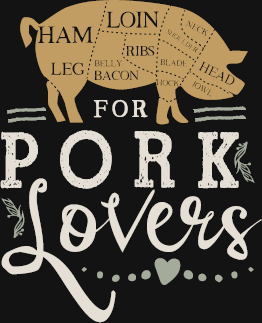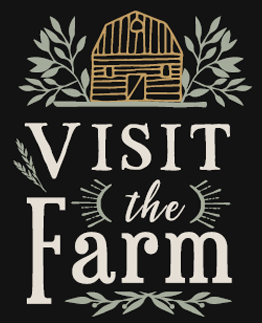Unparalleled health benefits and environmental justice make Mangalitsa pork the pig product of choice. Period.
Here at Chickadee Hills Homestead, we get a lot of questions about the benefits of our pasture-raised Mangalitsa pork. That’s just fine by us. We love nothing more than educating our customers and the public about the health perks and environmental advantages of our humane, nature-friendly practice.
These days, everyone is aware of the health benefits of “eating right.” We’re not always clear on what that means, however, especially when it comes to meat. There exists a lot of disinformation about what healthy meat is and how it’s grown, as well as what eating the right means for your body.
Put simply: You should eat meat raised in a natural environment, with access to the foods pigs actually want to eat. Responsibly raised pork doesn’t require inputs; because of this, it’s better for your body and the world. Moreover, it contains some surprising nutrients, helping you and your family stay healthy now and over the long haul.
The Sunny Benefits of Lard
Lard was decried for years as an unhealthy, cholesterol-raising substance to avoid at all costs. But recent research shows this isn’t always true. It really depends on the pig.
Fat from pasture-raised pork – such as that which comes from our Mangalitsa hogs – is considerably healthier than the fat from other hogs. That's especially true of those raised indoors, in confined spaces, away from green fields and sunlight. Most recently, and most excitingly, is the discovery of a high vitamin D content in pastured lard. Some studies show that vitamin D in pastured lard is second only to cod liver oil, containing 1,000 IUs of vitamin D a serving.
Keep in mind that vitamin D is fat soluble, which means your body can’t digest it if you don’t take it with fat. Hence, supplements aren’t usually the answer. However, lard is the perfect package, loaded with both the vitamin and the fat it needs for absorption. Of course, that’s only the case if your lard comes from pastured hogs, since pigs – just like humans – need sunlight to synthesize vitamin D.
Lard contains other nutrients as well. Vitamin E is a big one. It protects us against free radicals, keeping the brain healthy and streamlining a number of enzymatic processes. Also a fat-soluble nutrient, it pairs well with lard. Selenium is another beneficial micro-nutrient, fighting aging and boosting immunity. Once again, you don’t receive these benefits from factory hogs raised indoors.
Better for Public Health, Better for the Environment
Pasture-raised pork carries many environmental perks its factory counterpart cannot match. For instance, it:
- Doesn’t rely on monoculture GMO corn, which is incredibly damaging to the environment
- Is entirely antibiotic-free, avoiding the dangers of rampant antibiotic use
- Respects biodiversity
- Is a hyperlocal product, reducing the waste and pollution associated with products shipped in from far away
A closer look at each of these benefits reveals even greater advantages.
Because our pigs don’t eat genetically modified, homogenous corn, we don’t have to support industrial farming practices. That means fewer nitrogen inputs, less nitrogen runoff, and less polluted waterways. We don’t use glyphosate, which is destructive to beneficial insects, bees, Monarch butterflies and more – not to mention soil health. Also, because we eschew high-density farming practices, we do not produce massive amounts of manure, which add to greenhouse gas and also pollute the Earth.
Instead, we raise pigs in smaller numbers, on pasture. Additionally, we grow all the food we give our animals. Instead of shipping in massive amounts of grain and making up for deficiencies with injections and supplements, we give them pure, whole healthy ingredients. Exactly what you yourself want to eat.
Our pork is also completely antibiotic-free. Did you know that 80 percent of the antibiotics produced in this country is used on farms? Animals are exposed to too many antibiotics for too long. That’s not good because it’s only hastening the development of an antibiotic-resistant superbug – and no, that’s not just a conspiracy theory. It’s a genuine threat, says the Centers for Disease Control. Plus, it’s not suitable for pigs, who need friendly bacteria to thrive. That’s why here on the farm, we don’t use any antibiotics.
Lastly, lard is local. When you use it, you can avoid sourcing your fat from oils grown far away: corn, palm, coconut. If you live in town, your lard is only 10 miles away instead of thousands in the case of coconut oil. When you adopt this practice, your carbon footprint plummets.
Mangalitsa Pork: A Taste You Can Get Behind
So what’s the catch? Everything that’s good for you has to be gross, right? Is Mangalitsa pork beneficial for the environment but a dinnertime bore?
No. The high lard content makes this pork incredibly tasty, as does the healthy diet the pigs consume. Our pigs don’t eat chicken feed and animal parts. They enjoy red clover, white clover, hairy vetch, dandelions, pumpkins, apples, tomatoes, and cucumbers. They also get a healthy dose of acorns and hazelnuts, which are pig favorites. This results in red meat that looks more like beef and more like pork, as it’s supposed to look, rather than the pale factory “white meat.”
The result? Both the meat itself and the fat marbled throughout have a delicious flavor. In fact, folks often refer to Mangalitsa as “olive oil on legs” or the “Kobe beef of pork.” We’re guessing that doesn’t sound half bad, right? Add in some serious nutrient density, and you’ve got yourself a powerhouse protein. Plus, because of the high flavor content, you don’t need nearly as much seasoning. Here at Chickadee Hills Homestead, in fact, we frequently prepare pork with none at all. That’s right, not even salt. If that doesn’t tell you enough about the flavor, we don’t know what will!
Have questions about Mangalitsa pork and the things we are doing at Chickadee Hills Homestead? Want to place an order? Please get in touch today.



